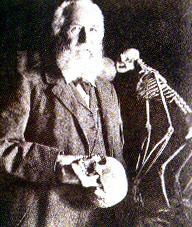
Ernst
Haeckel (1834-1919)
German biologist and Darwinian popularizer.
Biographies H
|
Ernst
Haeckel (1834-1919) |
|
George
Rostrevor Hamilton (1888-1967) |
|
Douglas
Harding (1909- ) |
|
Thomas
Hardy (1840-1928) |
|
Geoffrey
Hartman (1929- ) |
|
Robert
Emlyn "Humphrey" Havard (1901-85) |
|
William
Hazlitt (1778-1830) |
|
Georg
Friedrich Hegel (1770-1831) |
|
Martin
Heidegger (1889-1976) |
|
Werner
Heisenberg (1901-76) |
|
Ernest
Hemingway (1899-1961) |
|
Heraclitus
(540?-475? BC) |
|
Hermann
Hesse (1877-1962) |
|
Alfred
Hitchcock (1899-1980) |
|
Adolf
Hitler (1889-1945) |
|
Thomas
Hobbes (1588-1679) |
|
Friedrich
Holderlin (1770-1813) |
|
Homer |
|
Gerard
Manley Hopkins (1844-89) |
|
Horace
(65-8 B.C.) |
|
T. E.
Hulme (1883-1917) |
|
David
Hume (1711-1786) |
|
Edmund
Husserl (1859-1938) |
|
Aldous
Huxley (1894-1963) |
|
Thomas
Henry Huxley (1825-95) |
|
Stanley
Edgar Hyman (1919-1970) |